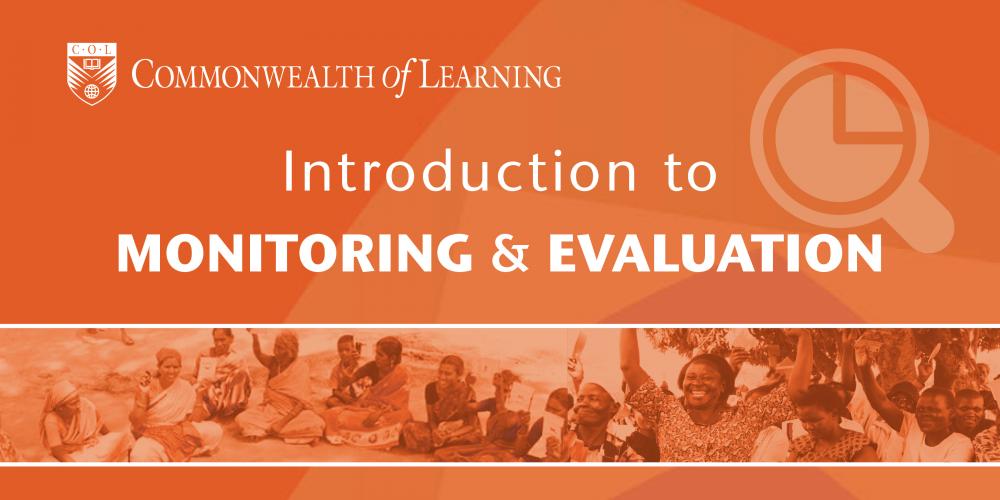Introduction to Monitoring and Evaluation - Partners

This portal is now inactive, and certificates are no longer issued. The Commonwealth of Learning (COL) will archive and provide access to the content. Visit https://oasis.col.org/ for more details.
Course Description
This course introduces participants to key concepts of Monitoring and Evaluation, to enable them to better understand, participate in, and contribute to the M&E processes of the Commonwealth of Learning. It is a self-directed course that can be taken individually or as part of a team. The course offers flexibility with options for learning the content. You will learn from readings, videos, discussions with other participants, practical activities, and short quizzes. Certification is available for those who complete the quizzes for all units
Course Contents
Unit 1: Monitoring and Evaluation Overview
Participants will:
- be introduced to Monitoring and Evaluation (M&E) and its key concepts
- understand some of the inter-relationships among key M&E concepts
- be able to identify where a pathway of change may need more development or details
- see how key M&E concepts are manifest in a relevant example
Unit 2: Results-based Monitoring and Evaluation
Participants will:
- understand the key elements of results-based M&E
- be able to distinguish the roles of monitoring and evaluation activities
- be able to identify where there is a breakdown in the logic of a results chain
Unit 3: Theory of Change
Participants will:
- understand key elements of a theory of change (ToC)
- become familiar with the process of constructing a theory of change
- be able to analyse a theory of change to check the logic of pathways of change and the evidence for them
Unit 4: Logical Frameworks
Participants will:
- understand the purpose of a Logframe
- be able to identify the key elements of a logframe
- review the links between different results levels in a logframe
- consider possible indicators for logframes and how results can be measured
- review the appropriateness of assumptions
Unit 5: Indicators and Means of Verification
Participants will:
- understand how indicators can be used as a sign of the results
- learn about the process for developing SMART and gender-responsive indicators
- identify possible evidence (means of verification) that can be used to track progress against indicators
Unit 6: Developing an M&E Strategy
Participants will:
- understand the necessity of and critical components of M&E strategies
- be able to develop the outline for a broad M&E strategy
Unit 7: Data Collection Methods - Overview
Participants will:
- understand the importance of balancing comprehensiveness versus the cost of data collection
- be able to distinguish between primary and secondary data
- identify the strengths and weaknesses of quantitative and qualitative data
- have an overview of a variety of data collection methods and sampling approaches.
Unit 8: Overview of Quantitative Methods
Participants will:
- learn about a variety of quantitative methods used in M&E and types of analysis to use for quantitative data collected.
- understand the difference between descriptive and inferential statistics.
Unit 9: Overview of Qualitative Methods
Participants will:
- learn about a variety of qualitative methods used in M&E
- have an overview of types of analysis to use for qualitative data, with a focus on content analysis.
Unit 10: Overview of Participatory Methods and Approaches to M&E
Participants will:
- understand the importance of a participatory approach to M&E
- be able to identify features of participatory M&E as well as common methods and approaches.
Target audience
This course is intended for COL partner staff who are currently or will be working on the implementation of a COL project. It is also a useful introduction to M&E for COL staff and consultants who will be overseeing or supporting M&E for a COL project.
Background/pre-requisite: This course does not require any prior exposure to Monitoring and Evaluation.
Expected time investment: There are 10 units in this course. It is expected that each unit of the course will take approximately 3-5 hours to complete (30-50 hours total). There is no time limit in which you must complete the course or a particular unit
Mentoring: This is intended to be a self-directed course. If you are currently working with COL on a project, a COL staff member or consultant may arrange to provide support or feedback to you/your team as you work through the course. They may also arrange supplementary activities related to your specific COL project, aligned to the course. You will be advised of these arrangements prior to enrolling.
Outcomes of this Course
By the end of this course, participants will: Understand key terms and concepts related to M&E; and be able to critically engage with and participate in core M&E processes including contributing to the development and interrogation of theories of change, logframes, indicators and Means of Verification, M&E strategies and data collection.
Certificates
You will be awarded a Certificate of Completion by COL based on the following criteria:
1. Accessing readings and videos
2. Completion of quizzes for all units (no minimum score)
Copyright 2022· All rights reserved
Designed by Zymphonies

